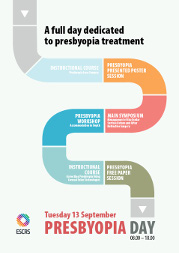Posters
Cross-linked lenticule insertion for moderate keratoconus: new technique
Poster Details
First Author: R. Fogla INDIA
Co Author(s): G. Shah
Abstract Details
Purpose:
To describe clinical outcomes of a new innovative technique of tissue addition using cross linked donor corneal tissue in the management of keratoconus.
Setting:
Cornea Clinic, Apollo Hospitals, Hyderabad, India
Methods:
6 eyes of 6 patients, (M:F=3:3) mean age 25.7 years with moderate keratoconus who were contact lens intolerant, were included in this study. 9mm stromal pocket was created at 200 microns depth using femtosecond laser, followed by insertion of a 8mm stromal lenticule of 100 microns thickness via a 5mm opening in the cornea. Donor lenticule included the Bowmans layer, was prepared using femtosecond laser & cross linked prior to insertion (riboflavin soakage for 30 mins, followed by UVA exposure 9mW/cm2 for 10 mins).
Results:
All eyes completed 6 months follow up. Average UCVA & BSCVA improved from 5/60 & 6/18 preop to 6/45 & 6/12 postop. Average keratometry values did not change significantly, 52.2 D preop to 52.09 postop. Central pachymetry & minimum pachymetry values were 450 & 417 microns preop compared to 557 & 525 microns postop. UCVA improved by 1.3 lines, (range 1-4 lines), and BSCVA improved by 1 line, (range 1-4 lines) at last follow up. All patients appreciated improvement in quality of vision. No adverse events were noted, and none of the eyes showed evidence of progression.
Conclusions:
Tissue addition using cross-linked donor corneal lenticule, seems to improve corneal thickness, stabilise progression and improve visual acuity without any adverse effect in eyes with moderate keratoconus.
Financial Disclosure:
NONE





